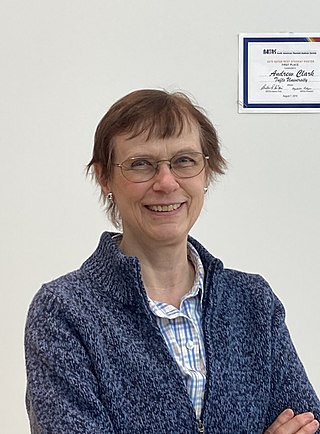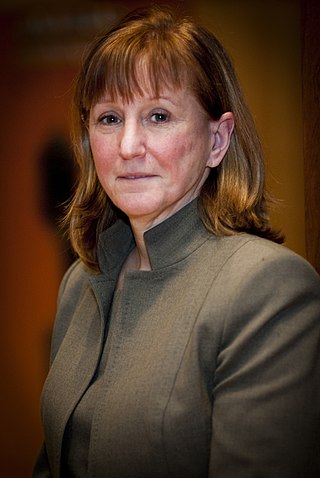Related Research Articles

Nafion is a brand name for a sulfonated tetrafluoroethylene based fluoropolymer-copolymer discovered in the late 1960s by Dr. Walther Grot of DuPont. Nafion is a brand of the Chemours company. It is the first of a class of synthetic polymers with ionic properties that are called ionomers. Nafion's unique ionic properties are a result of incorporating perfluorovinyl ether groups terminated with sulfonate groups onto a tetrafluoroethylene (PTFE) backbone. Nafion has received a considerable amount of attention as a proton conductor for proton exchange membrane (PEM) fuel cells because of its excellent chemical and mechanical stability in the harsh conditions of this application.

Chinedum Osuji is the Eduardo D. Glandt Presidential Professor and the Departmental Chair of the Chemical and Biomolecular Engineering (CBE) at University of Pennsylvania. He is also a former Taekwondo Olympian and represented Trinidad and Tobago. His laboratory works on polymers and soft materials for functional application including liquid filtration. He is the associate editor of the journal Macromolecules.

Monica Olvera de la Cruz is a Mexican born, American and French soft-matter theorist who is the Lawyer Taylor Professor of Materials Science and Engineering and Professor of Chemistry, and by courtesy Professor of Physics and Astronomy and of Chemical and Biological Engineering at Northwestern University.

Valerie Sheares Ashby is a chemist and university professor who currently serves as President of the University of Maryland, Baltimore County. She was the Dean of Trinity College of Arts and Sciences at Duke University from 2015 to 2022 and formerly chair of the chemistry department at the University of North Carolina at Chapel Hill from 2012 to 2015. With her research group, she holds ten patents. On April 4, 2022 it was announced that Ashby would assume the position of president of the University of Maryland, Baltimore County.
Edwin Lorimer Thomas is the Ernest Dell Butcher Professor of Engineering at Rice University and served as the William and Stephanie Sick Dean of the George R. Brown School of Engineering from 2011-2017. Thomas earned a B.S. in mechanical engineering from the University of Massachusetts Amherst in 1963 and a Ph.D. in materials science and engineering from Cornell University in 1974. Thomas was awarded the status of Fellow in the American Physical Society, after they were nominated by their Division of Polymer Physics in 1985, for being a leading authority on the application of electron microscopy and scattering techniques to problems in polymer structure-property relations and for contributions on mosaic block structure of semicrystalline polymers as well as on the structure of the noncrystalline solid state of glassy polymers.
Elizabeth J. (Betsy) Beise is a Professor of Physics and Associate Provost at the University of Maryland, College Park. She works on quantum chromodynamics, nucleon structure and fundamental symmetries.

Amalie L. Frischknecht is an American theoretical polymer physicist at Sandia National Laboratories in Albuquerque, New Mexico. She was elected a fellow of the American Physical Society (APS) in 2012 for "her outstanding contributions to the theory of ionomers and nanocomposites including the development and application of density functional theory to polymers". Her research focuses on understanding the structure, phase behavior, and self-assembly of polymer systems, such as complex fluids polymer nanocomposites, lipid bilayer assemblies, and ionomers.
Ka Yee Christina Lee is a Professor of Chemistry and the Provost at the University of Chicago, where she succeeded Daniel Diermeier on February 1, 2020. She works on membrane biophysics, including protein–lipid interactions, Alzheimer's disease and respiratory distress syndrome. She is a Fellow of the American Institute for Medical and Biological Engineering and American Physical Society.

Peggy Cebe is a professor of physics in the Department of Physics and Astronomy of Tufts University.

Katherine T. Faber is an American materials scientist and engineer and is the Simon Ramo Professor of Materials Science at the California Institute of Technology (Caltech). Currently, Faber is the faculty representative for the Materials Science option at Caltech and is an adjunct Professor of Materials Science and Engineering at the McCormick School of Engineering and Applied Science at Northwestern University.

Dawn Austin Bonnell is the Senior Vice Provost for Research at the University of Pennsylvania. She has previously served as the Founding Director of the National Science Foundation Nano–Bio Interface Center, Vice President of the American Ceramic Society and President of the American Vacuum Society.

Thomas H. Epps, III is an American chemist and the Thomas & Kipp Gutshall Professor of Chemical & Biomolecular Engineering at the University of Delaware. He has a joint appointment in Materials Science & Engineering, and an affiliated appointment in Biomedical Engineering. He serves as the Director of the Center for Research in Soft Matter & Polymers, the Director of the Center for Hybrid, Active, and Responsive Materials, and the Co-Director of the Center for Plastics Innovations. His research considers the design, synthesis, characterization, and application of nanostructure-containing polymers related to biobased materials, drug delivery, alternative energy (batteries), nanotemplating, and composite-based personal-protective equipment. He is also the co-founder of Lignolix, which is focused on the valorization of biomass waste.

Anne Marie Mayes was an American material science and engineer and a Toyota professor at Massachusetts Institute of Technology (MIT), and MacVicar faculty fellow until 2006. She was the first woman to be promoted from assistant professor to tenured professor in the Department of Materials Science and Engineering at MIT. Mayes focused her research on lithium polymer batteries and the role of polymers in environmental issues. The Anne M. Mayes '86 Fellowship for graduate students at MIT is named in her honor.
Arthi Jayaraman is an Indian-American scientist who is the Centennial Term Professor for Excellence in Research and Education at the University of Delaware. Her research considers the development of computational models to better understand polymer nanocomposites and biomaterials. Jayaraman was elected Fellow of the American Physical Society in 2020.
Rose M. Mutiso is a Kenyan activist and materials scientist. She is co-founder and CEO of The Mawazo Institute. She is the research director of the Energy for Growth Hub. She was short listed for the 2020 Pritzker Emerging Environmental Genius Award.
Alice Elizabeth White is an American physicist. She is a professor and chair at the Boston University College of Engineering. Previously, she was Chief Scientist at Bell Labs. She is a fellow of the APS, the IEEE and the OSA.
Surita Bhatia is an American chemist who is Professor and Vice Provost of Faculty Affairs at Stony Brook University. Her work considers the structure of soft materials, including polymeric hydrogels and colloidal glasses. She was elected Fellow of the American Institute of Chemical Engineers, the American Institute for Medical and Biological Engineering and the Society of Rheology in 2020.
Shu Yang is a Chinese-American materials scientist who is the Joseph Bordogna Professor of Engineering and Applied Science and Chair of the Department of Materials Science and Engineering at the University of Pennsylvania. She is a Fellow of the Royal Society of Chemistry, American Physical Society, National Academy of Inventors and Materials Research Society.

Xiaodan Gu is the Nina Bell Suggs endowed professor of Polymer Science and Engineering at The University of Southern Mississippi. Since 2017, Gu has been a professor at Southern Miss where his research involves studying the physics and morphology of conjugated polymers.

Barbara Frisken a Canadian physicist who is a professor at the Simon Fraser University. Her research considers soft matter and the realisation of Polymer Electrolyte Membrane Fuel Cells. She is President of the Canadian Association of Physicists.
References
- ↑ "Karen I. Winey | Materials Research Laboratory at UCSB: an NSF MRSEC". www.mrl.ucsb.edu. Retrieved 2021-04-08.
- ↑ Winey, Karen (1991). Morphologies and morphological transitions in binary blends of diblock copolymer and homopolymer (PhD). University of Massachusetts Amherst. Retrieved 2021-04-08.
- ↑ "Karen I. Winey – Winey Lab" . Retrieved 2022-07-29.
- 1 2 "Materials Science and Engineering Spring Colloquium" (PDF). Northwestern McCormick School of Engineering. 2019-05-28.
- 1 2 "New solid polymer electrolyte outperforms Nafion; novel polymer folding". Green Car Congress. Retrieved 2021-04-08.
- ↑ "Training the next generation of globally minded researchers". Penn Today. Retrieved 2021-04-08.
- 1 2 "PEOPLE - All Together". alltogether.swe.org. 27 October 2020. Retrieved 2021-04-08.
- ↑ "Wellness Ambassadors | Office of the Provost| Penn Provost". provost.upenn.edu. Retrieved 2021-04-08.
- ↑ "Customized bio-synthetics". EurekAlert!. Retrieved 2021-04-08.
- ↑ Trigg, Edward B.; Gaines, Taylor W.; Maréchal, Manuel; Moed, Demi E.; Rannou, Patrice; Wagener, Kenneth B.; Stevens, Mark J.; Winey, Karen I. (August 2018). "Self-assembled highly ordered acid layers in precisely sulfonated polyethylene produce efficient proton transport". Nature Materials. 17 (8): 725–731. Bibcode:2018NatMa..17..725T. doi:10.1038/s41563-018-0097-2. ISSN 1476-4660. OSTI 1473945. PMID 29807986. S2CID 44065591.
- ↑ "Fellows nominated in 2003 by the Division of Polymer Physics". APS Fellows archive. Retrieved 2021-07-30.